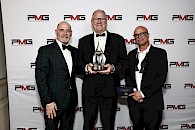
Black History / Black Futures Month - Humell Keith (Monze)
Humell Keith (Monze) is a musical artist, actor, entrepreneur, film & music producer, and television personality. He has been an active IATSE member in the Set Decorating department since 2013.
What was a key influence in your life that led you to the film industry as a career choice?
I grew up in Toronto, and my brother and I were introduced to the entertainment industry through our mom. I started as a model in newspapers and then we got into music and we were pretty successful with that. So, I've always been around the entertainment industry and then I got into making music videos. When I moved out west, I wanted to get in and be part of the Union. I started PA'ing (Production Assistant), and then I became a DGC (Directors Guild of Canada) member. I still am a DGC member, and when the opportunity opened up to become an IATSE team member I went for it and worked every single day I could, and then got my days.
I had a lot of certifications prior to getting into IATSE – film-wise, technical-wise, skill-wise. I just kept propelling myself. I am constantly taking courses and helping other members. Recently, I became a Shop Steward for the shows that I work on. I enjoy being active in the industry and am a very positive person, and it rubs off on other people.
So that's just how I got into film. It was just something that I've always wanted to do, even as a kid watching TV. I actually remember in kindergarten taking my dad's tools, and back then they had big box TVs, and I would take his tools and I would slowly take the screws out because I wanted to go inside the TV. I just love the art. I love the creative arts, music, the visual arts and working with like-minded people and seeing the final product. I'm a creative person and this is where I could go, and it would pay for my livelihood and provide more, and I just went for it.
What does Black History and Black Futures Month mean to you personally as a member of 891?
February 1st, I'm always excited. Black History Month – it’s like, ‘People are going to recognize me!’ Really, Black history is every single day of the year, because for hundreds of years, Black people have contributed to a lot of creative inventions that a lot of people use on this planet. It's just in the last, maybe 15 to 18 years we've been starting to get recognized for a lot of athletics, creative writing, speaking, standing up for rights and stuff like that. So every year, [February] is always a reminder, but in 2022, I'm happy to see more progress. I'm happy to see even the Union that I'm part of making it more inclusive, giving BIPOC people opportunities to showcase their talents and their skills.
Is there a specific figure in Black history that inspires you?
I really follow sports, and in recent years, NBA basketball has been so amazing. Every year, the athleticism and the feats that these athletes are reaching is great – even in recent years, to see the Toronto Raptors win a championship. People like Masai Ujiri – he's the president of the Toronto Raptors and has done a lot for Black youth in Africa, bringing that talent into Canada and bringing a championship to Canada in a country where we're more known for ice hockey or maybe football. These kids are making millions of dollars now, things they would never dream of, and getting opportunities to even help others back in their home countries. That's pretty inspiring.
You mentioned being a Shop Steward. From your perspective, how can unions do more to feature the contributions of members and kin from Black communities in the fight to improve health and safety in the industry?
Just more things like this – you know, you reached out, it's actually an honour…like they're actually reaching out to me to ask me how I feel and what things can be better, because I'm there every single day.
I saw something online the other day…there's this group on Facebook called Black in Vancouver that I'm in, and there was a question – “Name a comment or put a comment that is endearing, but it actually makes you feel awkward when you hear a comment like that.” One person put the first one, ‘Black don't crack.’ So yeah, it's true and it makes you smile. People that have melanin in their skin – stay youthful for a longer period of time rather than less melanated [sic] people. So it's great, but it would be better if it wasn't put as a stigma. ‘People of colour, have such youthful skin,’ would be a proper comment as opposed to, ‘Black don't crack.’ So that's a cool example of how people say ‘endearing’ things about people of colour, but in reality, it's like, come on, man, you don't gotta say it like that. It's just being more respectful of how you're talking about people, whether face to face or behind their back.
You’re speaking to something really important because representation matters. Micro-aggressions, for example, that's a health and safety issue. Racism is a health and safety issue for everybody.
You know, it doesn't have to have a funny connotation. It could just be straight up and real, like, ‘This guy's a great person.’ Not, ‘This Black guy is great.’ It starts with one person. Maybe I can inspire someone else or I could correct an inconsistency that doesn't really resonate with all Black people or people of colour. You know, if it starts with me, ‘Oh, let's ask Keith,’ well I’ll have good input on this, right? If I could start by contributing little things like that and it goes forward, inspire another young kid…I'm happy to do it.
What do you expect from a union colleague or coworker who wants to be an ally to Black communities?
Just be open to differences. I think a lot of people, you know, whether they're white or BIPOC or like me, I'm a young Black guy, but I'm open to all cultures. That's why I'm educated, and that's why I can speak on certain things. It's like, ask somebody specific, somebody First Nations. You could ask them, you know, there's been a lot of things coming up with the residential schools, have you been affected by that?
It's not just Black culture. It's First Nations. It's Asian people. Everybody gets hit up from different angles, you know? And I feel like when I see all this stuff with Indigenous people, it's like, you can never repay, like, ‘I think they want a monetary compensation’ – there's no amount of money that could repair this. Similar to Black people, there's no amount of money.
What I think will help is just knowing that this happened, acknowledging that this happened, and moving forward in a positive way. Treating everybody equally. If I look at it like this, if you're qualified for the position, if you know how to do the position, you should get that opportunity. Not, ‘This person is First Nation, this person is Asian, Black.’ Hire skilled people, don't hire them based off their skin tone. If I was putting a crew together, I'm hiring qualified people, not because of the colour of your skin.
Circling back to advice you'd give someone who wants to be a better ally…your point was around discussion, keeping the conversations going.
Yeah, keep the conversations going…Black culture shouldn’t only be recognized in February…It should be a year-round thing. [National Truth and Reconciliation Day], it shouldn’t be just a thing that happens in September. Do you know that – well, IATSE recognized it – but networks did not recognize [National Truth and Reconciliation Day]? Therefore, it wasn't a holiday.. Like, are you serious? Things like that rub me the wrong way.
Can you name one concrete change that could be made to help build solidarity on set?
Just actually giving people the opportunities. Don't give somebody a promotion because of the colour of their skin...if they're educated, and they have actually done the protocols...give them the opportunity. Give more people of colour, and I should say, more specifically, Black people, give them the opportunity. You can see in the history books, whether it's written or unwritten, Black people have contributed so much to this planet. Give us the opportunity and make it equal, right?








